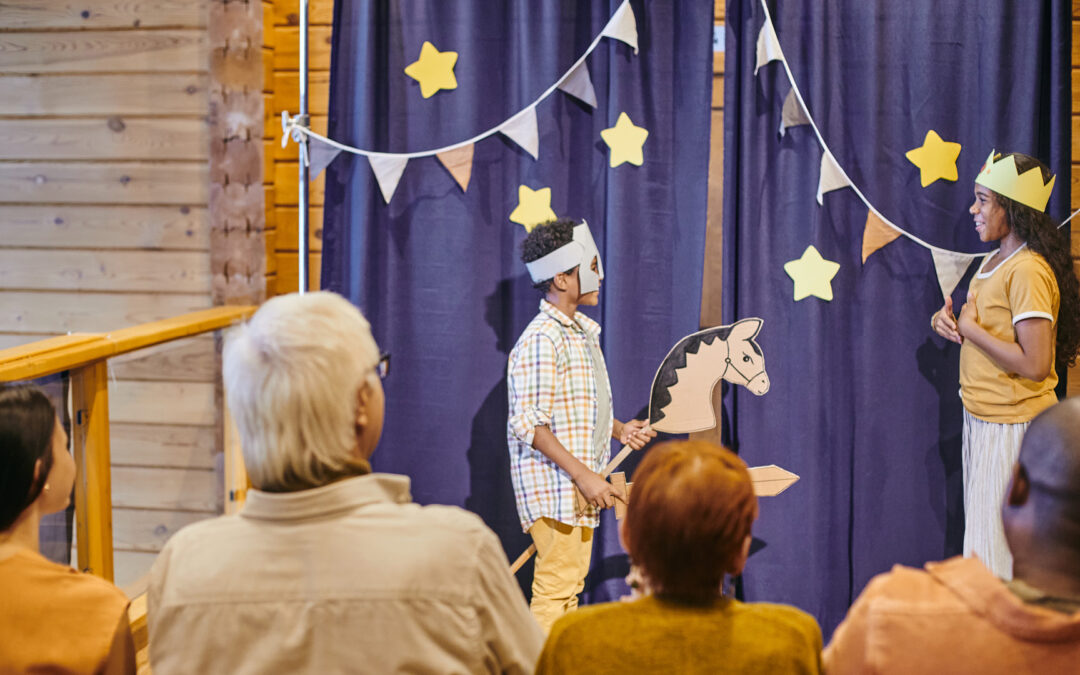Summer camps more and more or offering drama as part of their programs. Drama and skits are already part of children’s lives even before they start their school in the form of fictional plays at home such as doctors, nurses, pilots, engineers, dentists and more. This allows them to create their own identity by creating situations that have many similarities in the real world.
Globally, we are recognizing that one of the best ways to encourage and promote soft skills and emotional intelligence in children is through drama. Drama has many benefits to young people, and this is why it is often incorporated into camp programs.
1. Communication Skills Makes for Good Drama
According to the National Institutes of Mental Health, public speaking was rated as a number one fear at 75%, even more than death! Getting young people involved in drama early on can help them become more comfortable. They learn proper speech, delivery and presentation skills that can carry over to future careers. Well dressed, well presented, well-spoken, and well-read people in the workplace often can be traced back to experiences with drama. Dramas also help young people to become better communicators in life as it involves using voices and tones, facial expressions, body language, and movements, all of which are crucial in making them better and effective communicators in life
2. Writing
Working in drama also builds skills in writing. The written scripts are excellent models for their own writing. Sometimes the team is involved in writing their own scripts as well! From learning new lines for a drama, enacting communication games, writing and presenting a script, theatrics, and drama help young people develop their vocabulary, speech, and communication skills.
3. Responsibility
Those that are part of the team to put on a drama have many different responsibilities. Everyone needs to complete those responsibilities in order for the show to be a success. The team is counting on everyone doing their part, and the young people learn to be dependable and reliable.
4. Confidence
Even the shyest young person can learn to keep their inhibitions in check and face the world confidently when they have experiences in drama. Young people learn how to step up and speak out in other situations not just on stage. They also have experiences speaking with adults.
5. Mental Health
Through the past few years, more and more people are trying to fight the stigma that comes with mental health. They do this by educating people that it is alright to talk to others when they feel like it. Drama helps children understand this from a young age, so when there comes a day and they do feel they need to talk, they will not hide away from it.
6. Life’s Problems
Well written scripts illustrate many of the problems we all face in life. Young people that are acting in these scripts get the experience to “practice” dealing with these problems on stage before they have to face them in real life.
7. Creativity
Creativity is a crucial ingredient for problem solving, innovation, and entrepreneurship. Drama and theater are all about creativity!
8. Perspectives
Acting in a play allows young people to experience walking in “someone else’s shoes.” This could be someone very different from them. These experiences allow young people to have a wider perspective of the world. They will be more empathetic to others and will learn to value diversity.
9. Concentration
If you have ever tried to memorize lines, you know that it requires concentration. Drama is also all about timing. When young people are involved in a play they have to have many things in their mind at one – their lines, their position and actions on stage, what the others on stage are doing, and the audience. This helps build their muscles for concentrating later in life at home, school, and professionally.
10. Inclusive
Drama is a place for everyone, not just for the stars of the show. There are places where anyone can fit in. Tech crews, lighting, props, costumes, sets, understudies… there are countless ways to be involved in production besides being center stage. Those with different abilities, ethnicities, cultures, and personalities can come together around the common goal.
11. Collaboration
As mentioned above, creating a successful production takes a team. Everyone learns to cooperate to have all the pieces come together and create a successful production.
12. Self
Drama is a great way to help young people continue to refine their sense of self. As they explore characters, they see themselves in some and not in others and are able to clarify their own identity. It is also an outlet for self-expression to allow them to share this identity.
13. Critical Thinking
Acting out a script allows young people to make decisions, again, “in practice.” This builds critical thinking skills for when they have to make decisions and evaluations in the real world.
14. Physical Development
Dramas, which sometimes include dancing and lots of movement, help young with physical development. Just like sports, dramas are physically demanding, which in turn help young children to gain body strength, coordination, and control.
15. Social Skills
Being able to socialize with others is a vital skill that we all need to function in our world. Young people on a team, such as in drama, learn how to get along and value and respect one another. Working together in drama builds strong bonds that can lead to lifelong friendships.
At Jameson Camp we want to help young people “get outside and grow inside.” One way we help them grow inside is through opportunities in drama. We have been impacting the lives of young people since 1928. Sign up for our day camp, overnight camp, mini overnight camp, or our PACK leadership camp.

